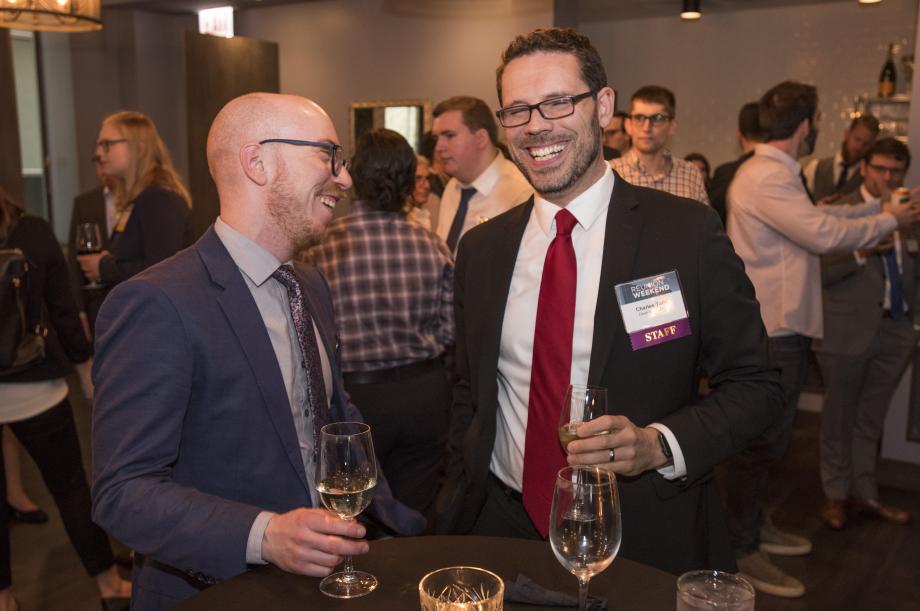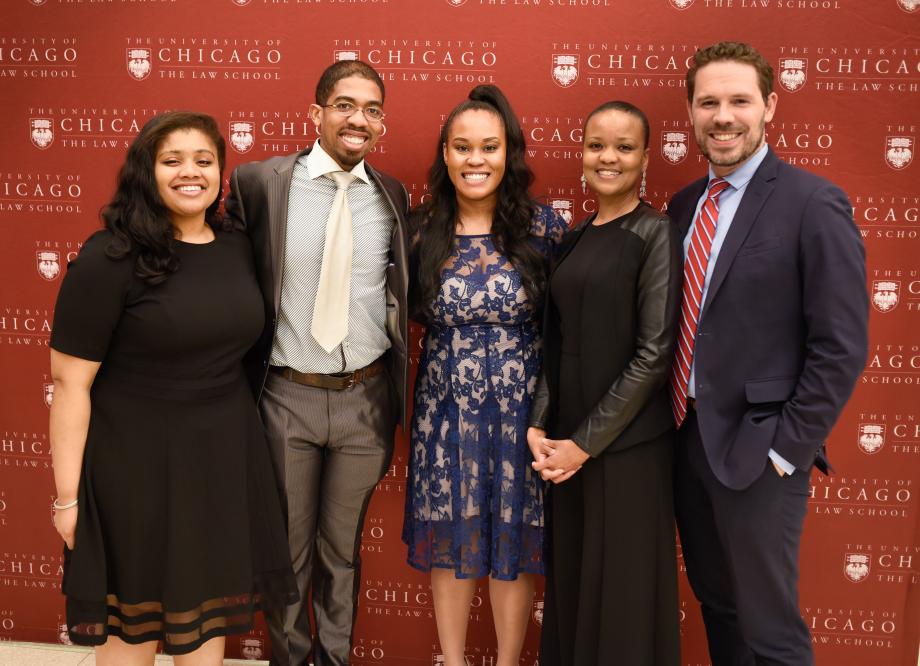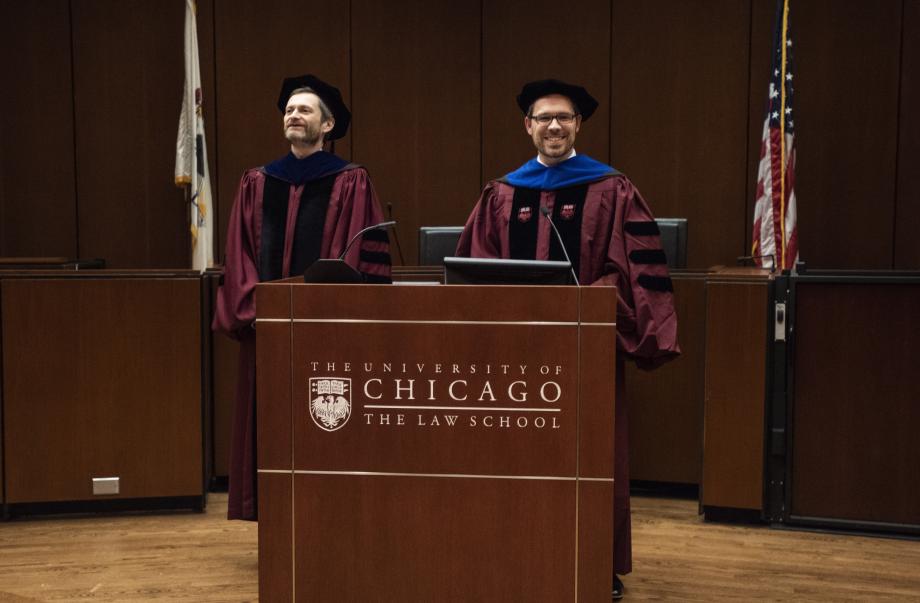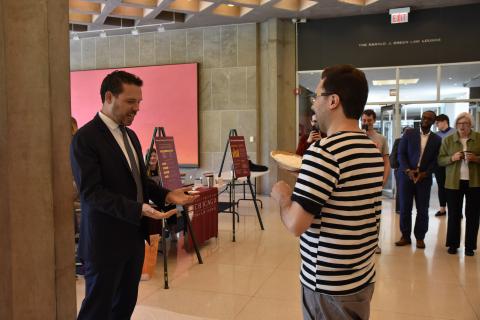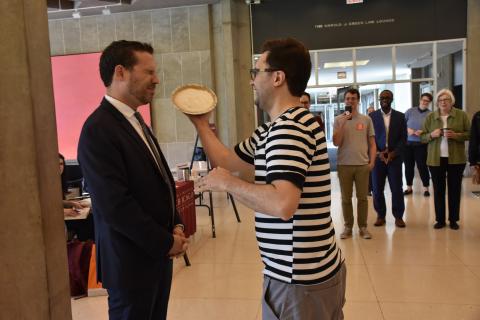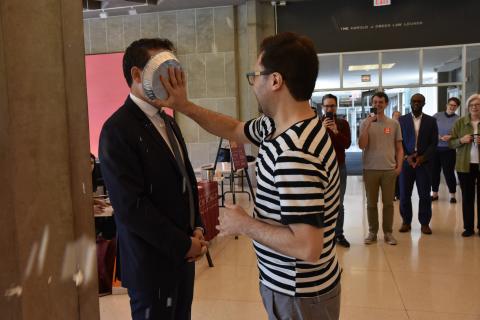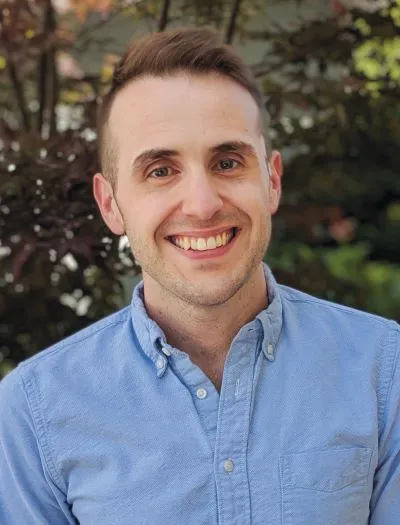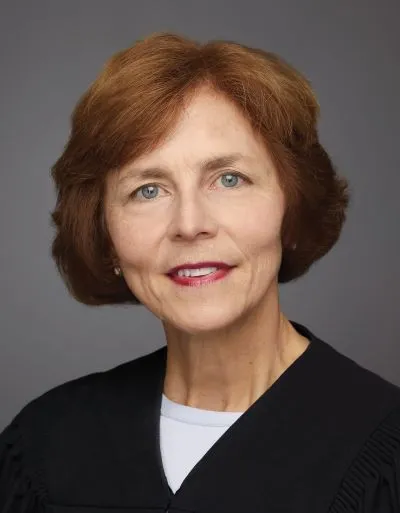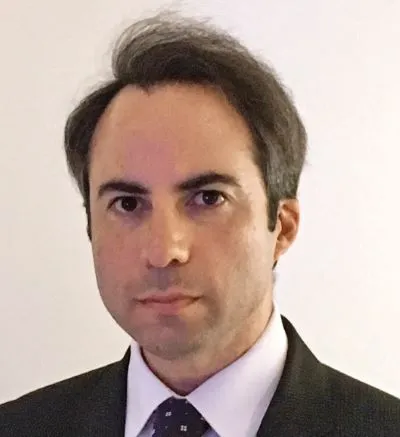The Thinker, the Counselor, the Champion
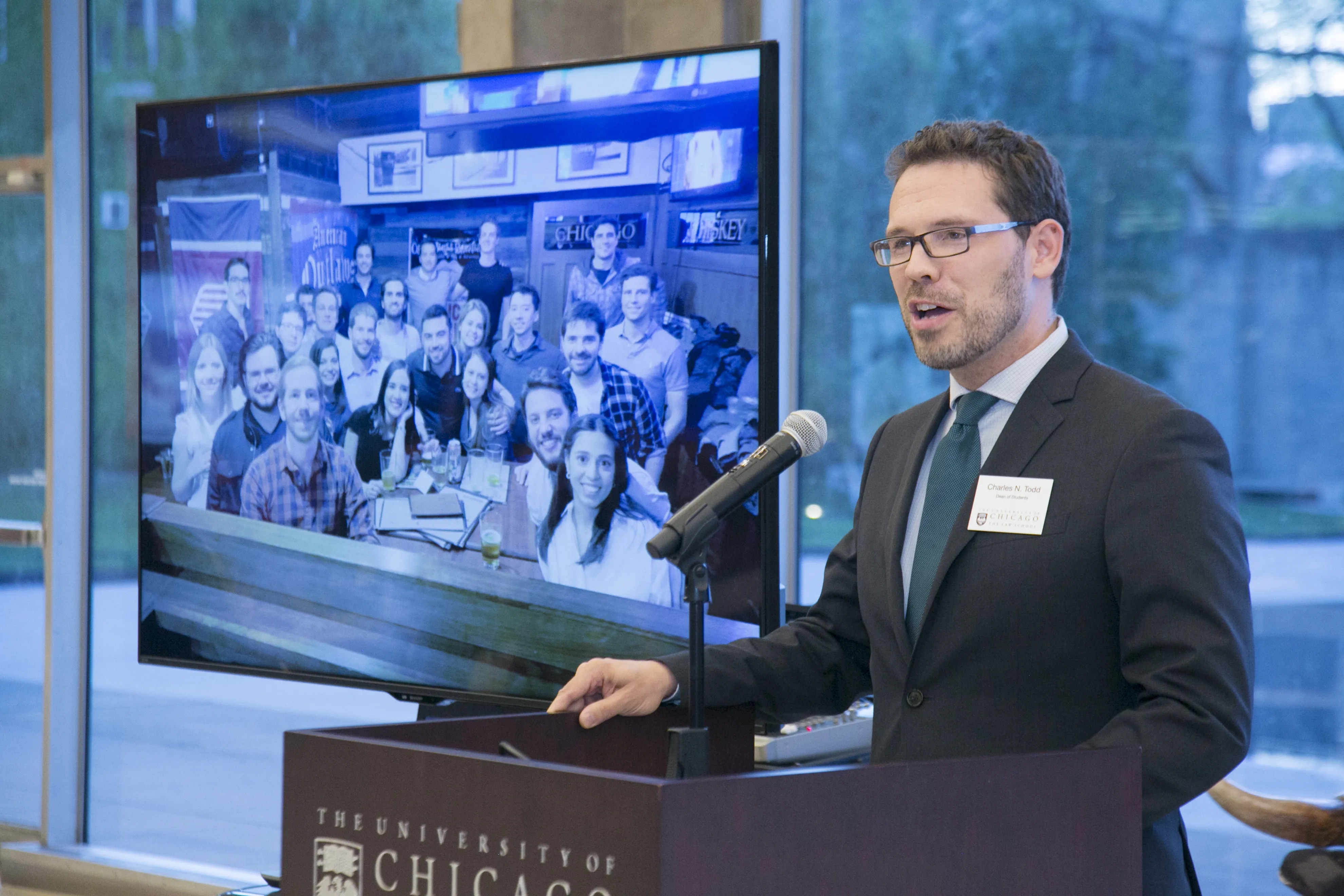
Charles N. Todd might have been a philosopher.
But when he was a University of Chicago graduate student, he needed money, and by the time he’d earned his PhD in 2011—paying his bills with jobs at the University’s Center for Leadership & Involvement and as a preceptor for the Masters of Arts Program in the Humanities—he’d discovered that he loved working with students. Turned out he was good at it, too; he could listen patiently, remain calm in a crisis, and think through complex issues. In the years that followed, he honed his skills in a variety of roles across campus: in medical school admissions, as a dean-on-call, as a resident head in undergraduate housing, and in the College’s dean of students’ office, where he became the deputy dean of students and chief of staff.
When he moved south of the Midway late last year to become the Law School’s dean of students, he brought with him a decade and a half of experience. He had a vast network across campus—with deans of students in the other divisions, the University Police, student counseling services, and deans-on-call, who provide crisis and emergency response. He knew how to design interventions to support students, create programs to satisfy different priorities and stakeholders, and navigate complicated interpersonal issues.
“Charles brings to our Law School a great depth and breadth of experience in all aspects of the work that our Dean of Students Office does,” said Dean Thomas J. Miles, the Clifton R. Musser Professor of Law and Economics. “He has already contributed much to our community, and we are grateful for his leadership, intellect, and compassion.”
Student affairs work, Todd said, has meaning for him.
“When I was a dean-on-call, I felt how incredibly privileged I was to be able to help someone in what might be their hour of greatest need,” he said. “This was work I wanted to do.”
Last spring, Becky Beaupre Gillespie, the Law School’s director of content, sat down with Todd to discuss his guiding principles and his goals for the Law School’s Dean of Students’ Office. Along the way, they also chatted about the fine line between providing support and encouraging independence, Todd’s study of the Greek concept akrasia, and his love for science fiction, opera, and Chicago’s food scene.
Gillespie: Charles, you are very much the product of the University of Chicago—you arrived in 2003 to pursue your PhD in philosophy, and you’ve been here ever since. What drew you to the institution?
Todd: I was interested in studying analytic philosophy, and the University of Chicago was one of the best places to do that—and to do it in a way that integrated the history of philosophy and offered opportunities for students to think critically and creatively across disciplines. I had been drawn to philosophy for a long time; I have always been interested in our beliefs, how we form them, what leads us to change them, and how we become better thinkers and more critical thinkers.
Gillespie: Ultimately, your graduate work focused on practical irrationality—specifically the choice to act against one’s own self-interest.
Todd: That’s right. The Greek term is akrasia, the phenomenon of acting against your better judgment. It’s a fascinating concept. There are debates going back to Plato and Aristotle: can you stare the good in the face and yet choose the bad? I’ve worked with undergrad and graduate students for over a decade, and I know that people really do act against their better judgment sometimes.
Gillespie: So then has that inquiry informed the work that you do now?
Todd: That’s hard to say. I am constantly thinking about how, from the student affairs side, we support students and encourage them to make good decisions. I think about the work of behavioral economists; I especially like the book Nudge [by University of Chicago economist Richard Thaler and former Law School Professor Cass Sunstein]. They explore how we “nudge” individuals toward better decisions through choice architecture. For me, that’s useful when thinking about how to structure processes to aid students in, say, reapplying for financial aid or guiding them through course registration or deciding how to divide up their time among student programs, studying, and class. There are so many decisions that they have to make as students, young adults, and soon-to-be professionals—and some of those decisions are going to be better than others. I want to make sure that, from the administrative side, the operational side, and the advising side, we provide a sensible and structured framework that’s going to help them make the best decisions. We want to encourage them to take charge of their decisions while simultaneously nudging them toward better decisions.
Gillespie: Speaking of decisions, I’m always intrigued by the choices people make as their careers unfold—the ways in which they discover talents and passions, and the ways in which those discoveries sometimes cause them to change course. How did a doctoral student in philosophy end up pursuing a career in student affairs?
Todd: The easiest answer is that I needed to support myself financially while I was a graduate student, and I took jobs that involved working with students.
Gillespie: And then you made a career out of it.
Todd: I did—I enjoyed it, and I was good at it. I think one of the hardest things for anyone to do is to find work that they enjoy, excel at, and that allows them to contribute in a meaningful way. This pushed all three buttons for me.
Gillespie: Your career path led you here late last year, when you became the Law School’s dean of students. What are the guiding principles you bring to the office?
Todd: We are training our students to become independent and self-sufficient, and, in order to do that, we have to consider how our policies and procedures encourage that type of independence—and independent decision-making in particular—as opposed to doing everything for them. We don’t serve any students well if we hold their hands all the way to the finish line. There's a balance in terms of providing support and encouraging independence and self-sufficiency.
Gillespie: Who, or what, instilled those values in you?
Todd: My family was a huge influence in thinking about what it means to become independent and develop self-sufficiency. Some of that was circumstantial: my family moved constantly growing up because my dad had job opportunities that took us places—Saudi Arabia, North Carolina, Kuwait. I spent my time bouncing back and forth among different types of schools, states, and countries. I was constantly thrust into new situations and cultures. I often felt like I was a fish out of water and had to struggle to find my place. Sometimes I had incredibly powerful and dedicated mentors who guided me—and other times I didn’t, and I felt at a loss. I think my commitment to student affairs work comes from having learned how valuable it is to have a powerful mentor, someone who’s thinking about you and caring about your development. I've seen, too, how important it is to develop grit, resilience, and independence—and I’ve experienced the way in which that can be a source of strength for a young person.
Gillespie: Tell me about some of your goals as dean of students. Are there specific initiatives you have planned?
Todd: Two things come to mind right now. One is that we live in a polarized moment in our culture, and I think institutions of higher education have an opportunity—and maybe an obligation—to encourage better communication and encourage our students to listen and expand their horizons. I don’t think our place is to force students to change their values or beliefs, but I do hope that we can encourage a better dialogue. To that end, we are adding an orientation program called “Hearing One Another.” It's a small-group workshop that was developed by University of Chicago social scientists, based on research about how we listen to one another and what types of things keep us from listening to one another. Listening is, in a way, the flipside of freedom of expression, which is another important University and Law School value. If no one's hearing what you’re saying and you're not listening to what others are saying, you will have missed out. We've also hired a new director of diversity and inclusion, Christopher Clarke, who will help us continue this work through additional workshops during the year.
Another priority is wellness. Our students form habits in law school that can either sustain them as they head off into the workforce or can negatively impact them. Our plan is to launch a new wellness week in the fall along with a field day where we’re going to get our students out to compete in friendly athletic exercises, things like kickball and tug-of-war. We already have yoga and mindfulness. The goal is to get students thinking about wellness and working to develop good habits.
Gillespie: What Law School tradition do you most enjoy?
Todd: I love Coffee Mess. It’s a great time to just be present and available to students. I love that there are faculty and a wide range of staff there, too. It's a very equalizing moment for the community. So many students have told me that Wednesday is their happiest day of the week.
Gillespie: Let’s switch gears a bit and talk about the things you enjoy outside of work, starting with a book that resonated deeply.
Todd: One book? There are too many—and they all resonate in different ways! But one that I particularly love to share with people is Oblomov by the 19th-century Russian writer Ivan Goncharov. It’s a 400-page book in which the main character spends something like the first 100 pages trying to figure out if he’s going to get out of bed.
Gillespie: Wow. That’s some serious indecision.
Todd: It’s fascinating, especially if you’re thinking about practical irrationality and the way in which even decision-making can become a challenge. I also love science fiction. I’ve always been a big fan of books like Dune [by Frank Herbert, published in 1965] that transport you to
other worlds and present really interesting ways to think about our own societal problems. I also like Cutting for Stone [by the Ethiopian-born, Indian-American medical doctor Abraham Verghese, published in 2009].
Gillespie: Do you have a favorite movie?
Todd: I love The Matrix. I’ve seen Star Wars a million times. I love to recommend the Spanish film Abre Los Ojos (Open Your Eyes). I also like Bollywood films—I love the drama, the importance of family, the music.
Gillespie: If you could pick one person—dead or alive—to watch one of these movies with, who would it be and what would you want to discuss afterward?
Todd: Oh, goodness. I would be fascinated to hear what the philosopher Ludwig Wittgenstein thinks about these contemporary ways of exploring some of the questions [posed by films like The Matrix]. I would be really curious to know what someone like Frank Herbert or Isaac Asimov thinks about the field of science fiction now and the influence that they had on it. That would be really neat, too.
Gillespie: What do you like best about the city of Chicago?
Todd: I love the food. I love the lakefront, the arts, the theater scene, the neighborhoods. And I love that transition from winter to spring—you know, that first warm day in April or May, when everyone has the same idea to go out and hit the lakefront trail at the exact same time.
Gillespie: What are your favorite things to do outside work?
Todd: I travel a lot still. I just got back from China, and I was in Oaxaca over Christmas break. My next trip I’m planning is to Cambodia. I love to camp, and I’ve been slowly working around the national parks. I enjoy the opera and am a subscriber to the Lyric. I’m a foodie, and I love trying new things.
Gillespie: Is there anything we haven’t discussed that you'd like our community to know?
Todd: I’m available as a resource. It’s easy for people, for students, to feel alone or isolated or to believe that the people who work here aren’t there for them, or for students like them. I want students to know that our office is committed to their success. I hope that they will take the time to get to know me, to share with me, and to let me know how I can be a resource and a support for them.
